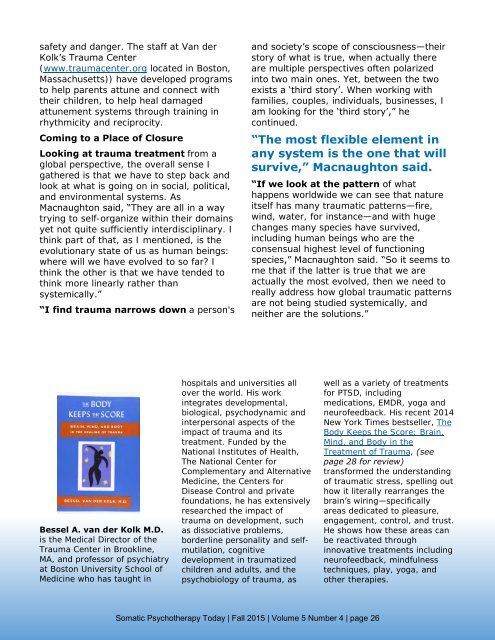Somatic Psychotherapy Today
1RCP3xp
1RCP3xp
You also want an ePaper? Increase the reach of your titles
YUMPU automatically turns print PDFs into web optimized ePapers that Google loves.
safety and danger. The staff at Van der<br />
Kolk’s Trauma Center<br />
(www.traumacenter.org located in Boston,<br />
Massachusetts)) have developed programs<br />
to help parents attune and connect with<br />
their children, to help heal damaged<br />
attunement systems through training in<br />
rhythmicity and reciprocity.<br />
Coming to a Place of Closure<br />
Looking at trauma treatment from a<br />
global perspective, the overall sense I<br />
gathered is that we have to step back and<br />
look at what is going on in social, political,<br />
and environmental systems. As<br />
Macnaughton said, “They are all in a way<br />
trying to self-organize within their domains<br />
yet not quite sufficiently interdisciplinary. I<br />
think part of that, as I mentioned, is the<br />
evolutionary state of us as human beings:<br />
where will we have evolved to so far? I<br />
think the other is that we have tended to<br />
think more linearly rather than<br />
systemically.”<br />
“I find trauma narrows down a person's<br />
and society’s scope of consciousness—their<br />
story of what is true, when actually there<br />
are multiple perspectives often polarized<br />
into two main ones. Yet, between the two<br />
exists a ‘third story’. When working with<br />
families, couples, individuals, businesses, I<br />
am looking for the ‘third story’,” he<br />
continued.<br />
“The most flexible element in<br />
any system is the one that will<br />
survive,” Macnaughton said.<br />
“If we look at the pattern of what<br />
happens worldwide we can see that nature<br />
itself has many traumatic patterns—fire,<br />
wind, water, for instance—and with huge<br />
changes many species have survived,<br />
including human beings who are the<br />
consensual highest level of functioning<br />
species,” Macnaughton said. “So it seems to<br />
me that if the latter is true that we are<br />
actually the most evolved, then we need to<br />
really address how global traumatic patterns<br />
are not being studied systemically, and<br />
neither are the solutions.”<br />
Bessel A. van der Kolk M.D.<br />
is the Medical Director of the<br />
Trauma Center in Brookline,<br />
MA, and professor of psychiatry<br />
at Boston University School of<br />
Medicine who has taught in<br />
hospitals and universities all<br />
over the world. His work<br />
integrates developmental,<br />
biological, psychodynamic and<br />
interpersonal aspects of the<br />
impact of trauma and its<br />
treatment. Funded by the<br />
National Institutes of Health,<br />
The National Center for<br />
Complementary and Alternative<br />
Medicine, the Centers for<br />
Disease Control and private<br />
foundations, he has extensively<br />
researched the impact of<br />
trauma on development, such<br />
as dissociative problems,<br />
borderline personality and selfmutilation,<br />
cognitive<br />
development in traumatized<br />
children and adults, and the<br />
psychobiology of trauma, as<br />
well as a variety of treatments<br />
for PTSD, including<br />
medications, EMDR, yoga and<br />
neurofeedback. His recent 2014<br />
New York Times bestseller, The<br />
Body Keeps the Score: Brain,<br />
Mind, and Body in the<br />
Treatment of Trauma, (see<br />
page 28 for review)<br />
transformed the understanding<br />
of traumatic stress, spelling out<br />
how it literally rearranges the<br />
brain’s wiring—specifically<br />
areas dedicated to pleasure,<br />
engagement, control, and trust.<br />
He shows how these areas can<br />
be reactivated through<br />
innovative treatments including<br />
neurofeedback, mindfulness<br />
techniques, play, yoga, and<br />
other therapies.<br />
<strong>Somatic</strong> <strong>Psychotherapy</strong> <strong>Today</strong> | Fall 2015 | Volume 5 Number 4 | page 26


